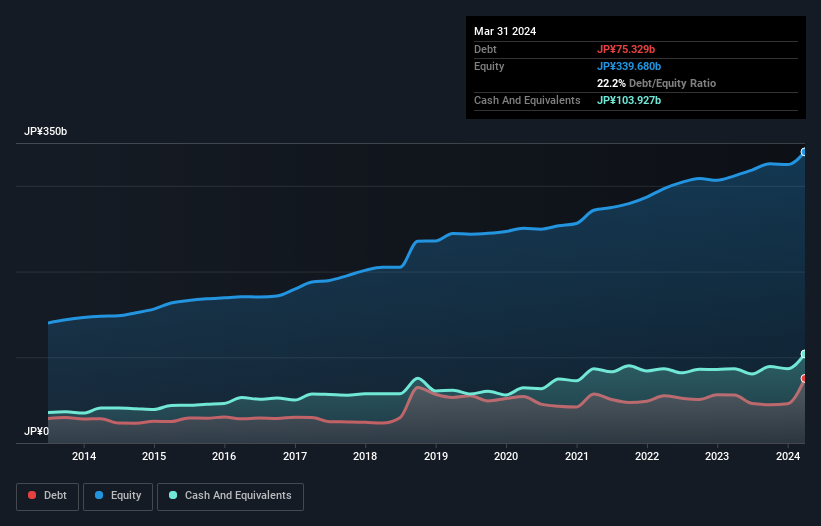The external fund manager backed by Berkshire Hathaway's Charlie Munger, Li Lu, makes no bones about it when he says 'The biggest investment risk is not the volatility of prices, but whether you will suffer a permanent loss of capital.' So it might be obvious that you need to consider debt, when you think about how risky any given stock is, because too much debt can sink a company. Importantly, Adeka Corporation (TSE:4401) does carry debt. But is this debt a concern to shareholders?
When Is Debt A Problem?
Debt assists a business until the business has trouble paying it off, either with new capital or with free cash flow. If things get really bad, the lenders can take control of the business. However, a more frequent (but still costly) occurrence is where a company must issue shares at bargain-basement prices, permanently diluting shareholders, just to shore up its balance sheet. Of course, the upside of debt is that it often represents cheap capital, especially when it replaces dilution in a company with the ability to reinvest at high rates of return. When we examine debt levels, we first consider both cash and debt levels, together.
See our latest analysis for Adeka
What Is Adeka's Debt?
As you can see below, at the end of March 2024, Adeka had JP¥75.3b of debt, up from JP¥55.9b a year ago. Click the image for more detail. But on the other hand it also has JP¥103.9b in cash, leading to a JP¥28.6b net cash position.

A Look At Adeka's Liabilities
According to the last reported balance sheet, Adeka had liabilities of JP¥134.4b due within 12 months, and liabilities of JP¥69.0b due beyond 12 months. Offsetting these obligations, it had cash of JP¥103.9b as well as receivables valued at JP¥115.6b due within 12 months. So it can boast JP¥16.1b more liquid assets than total liabilities.
This surplus suggests that Adeka has a conservative balance sheet, and could probably eliminate its debt without much difficulty. Simply put, the fact that Adeka has more cash than debt is arguably a good indication that it can manage its debt safely.
The good news is that Adeka has increased its EBIT by 9.4% over twelve months, which should ease any concerns about debt repayment. When analysing debt levels, the balance sheet is the obvious place to start. But ultimately the future profitability of the business will decide if Adeka can strengthen its balance sheet over time. So if you want to see what the professionals think, you might find this free report on analyst profit forecasts to be interesting.
Finally, a company can only pay off debt with cold hard cash, not accounting profits. Adeka may have net cash on the balance sheet, but it is still interesting to look at how well the business converts its earnings before interest and tax (EBIT) to free cash flow, because that will influence both its need for, and its capacity to manage debt. In the last three years, Adeka's free cash flow amounted to 27% of its EBIT, less than we'd expect. That's not great, when it comes to paying down debt.
Summing Up
While it is always sensible to investigate a company's debt, in this case Adeka has JP¥28.6b in net cash and a decent-looking balance sheet. And it also grew its EBIT by 9.4% over the last year. So we don't have any problem with Adeka's use of debt. Over time, share prices tend to follow earnings per share, so if you're interested in Adeka, you may well want to click here to check an interactive graph of its earnings per share history.
If, after all that, you're more interested in a fast growing company with a rock-solid balance sheet, then check out our list of net cash growth stocks without delay.
New: Manage All Your Stock Portfolios in One Place
We've created the ultimate portfolio companion for stock investors, and it's free.
• Connect an unlimited number of Portfolios and see your total in one currency
• Be alerted to new Warning Signs or Risks via email or mobile
• Track the Fair Value of your stocks
Have feedback on this article? Concerned about the content? Get in touch with us directly. Alternatively, email editorial-team (at) simplywallst.com.
This article by Simply Wall St is general in nature. We provide commentary based on historical data and analyst forecasts only using an unbiased methodology and our articles are not intended to be financial advice. It does not constitute a recommendation to buy or sell any stock, and does not take account of your objectives, or your financial situation. We aim to bring you long-term focused analysis driven by fundamental data. Note that our analysis may not factor in the latest price-sensitive company announcements or qualitative material. Simply Wall St has no position in any stocks mentioned.
About TSE:4401
Flawless balance sheet with solid track record and pays a dividend.
Similar Companies
Market Insights
Community Narratives



